|
Di seguito tutti gli interventi pubblicati sul sito, in ordine cronologico.
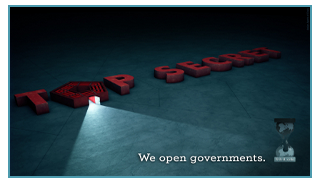
PayPal joined Moneybookers, Amazon, Tableau and EveryDNS in cancelling services for WikiLeaks.
In a statement posted on its website, the company wrote: "PayPal has permanently restricted the account used by WikiLeaks due to a violation of the PayPal Acceptable Use Policy, which states that our payment service cannot be used for any activities that encourage, promote, facilitate or instruct others to engage in illegal activity. We’ve notified the account holder of this action."
Daniel Ellsberg and many WikiLeaks supporters have called for a boycott of Amazon. PayPal may be next.
There are many other ways for supporters of truth and free speech to contribute to WikiLeaks, and we would like to encourage you to do so: http://213.251.145.96/support.html
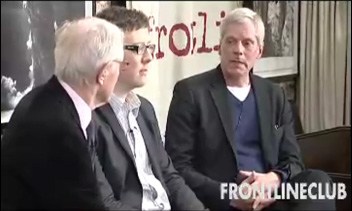 Frontline Club: WikiLeaks - The US embassy cables Frontline Club: WikiLeaks - The US embassy cables
This event, held on December 1st, featured WikiLeaks spokesman Kristinn Hrafnsson and data journalist James Ball in a discussion with Colleen Graffy, former deputy assistant secretary of state for public diplomacy (US State Department), and Sir Richard Dalton, associate fellow of the Middle East and North Africa programme at Chatham House. The discussion was moderated by author and broadcaster Tom Fenton.
The video recording of the event is now available on the Frontline website.
BBC HardTalk: WikiLeaks - Open Secrets
In this December 3rd panel show, Host Stephen Sackur speaks with former UK ambassador Carne Ross, former US deputy secretary of state John Negroponte, and WikiLeaks data journalist James Ball about the Cablegate disclosures.
The video is available on the BBC website until December 10th.
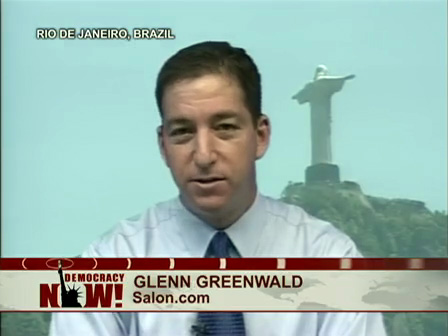
Democracy Now!: Is WikiLeaks’ Julian Assange a Hero?
Amy Goodman and Juan Gonzales hosted a debate between Glenn Greenwald of Salon and Steven Aftergood of Secrecy News on December 3rd.
Glenn Greenwald: "If you look at the overall record of WikiLeaks—and let me just stipulate right upfront that WikiLeaks is a four-year-old organization, four years old. They’re operating completely unchartered territory. Have they made some mistakes and taken some missteps? Absolutely. They’re an imperfect organization. But on the whole, the amount of corruption and injustice in the world that WikiLeaks is exposing, not only in the United States, but around the world, in Peru, in Australia, in Kenya and in West Africa and in Iceland, much—incidents that are not very well known in the United States, but where WikiLeaks single-handedly uncovered very pervasive and systematic improprieties that would not have otherwise been uncovered, on top of all of the grave crimes committed by the United States. There is nobody close to that organization in terms of shining light of what the world’s most powerful factions are doing and in subverting the secrecy regime that is used to spawn all sorts of evils."
The video and full transcript are available on the Democracy Now! website.
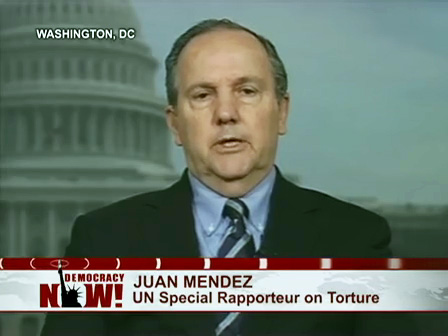
Democracy Now!: U.N. Special Rapporteur Juan Méndez: Instead of Focusing on Assange, U.S. Should Address WikiLeaks’ Disclosures of Torture
Democracy Now! interviewed Juan Méndez, the new U.N. Special Rapporteur on Torture and Other Cruel, Inhuman and Degrading Treatment or Punishment, on December 2nd. The interview focused on Cablegate revelations regarding US spying on UN officials and torture committed under the Bush administration.
Juan Méndez: "What I am really worried about is that we seem to be focusing on whether disclosing these cables is legal or illegal, whether it merits some kinds of action against Mr. Assange. We’re not really discussing the merits, the substance of what some of these things reveal. And in my case, for example, I’m very concerned about the documents that show that literally thousands of people were first imprisoned by American forces and then transferred to the control of forces in Iraq and perhaps even in Afghanistan, where they knew that these people were going to be tortured. That’s a very clear violation of a standard that applies to the United States as a signatory of the Convention Against Torture, and I want to know what’s being done about getting to the bottom of that."
The full video is available on the Democracy Now! website.
Turk, J.D. and Elliot feel that they own the hospital and have very much found their groove as interns. All interns get medical students assigned to them. J.D.'s student, Josh, is enthusiastic but makes a lot of mistakes on his first day, causing J.D. much annoyance to the point he tells him he shouldn't be a doctor. After some time to think about the events of the day, J.D. realizes that it was him who actually failed Josh. He then forces Josh to perform a procedure the same way Dr. Cox did for J.D. on his first day.
Elliot gives her med student, the arrogant Philip Chambers, a very hard time including some of the crap she took when she was a med student. She later learns from Dr. Kelso that Philip's father, who is visiting, is the CEO of the company that owns the hospital. Elliot then lets Philip slide through everything and does many of Philip's tasks and responsibilities herself. When he sees this, Dr. Kelso tells Elliot that she can not let Philip walk all over her and when she threatens to speak with his father he becomes obedient again.
Dr. Cox is attracted to Turk's med student, Kristen Murphy. Because he is not able to ask her out properly himself, Turk ends up helping him.
Read more: http://scrubs.wikia.com/wiki/My_Student#ixzz14hFwmpjj
 Il turista questa volta vi propone un magnifico lago del Trentino, caratteristico ma un po' dimenticato, caduto in oblio dopo che era diventato famoso a cavallo degli '50 e '60. Molti di voi avranno sentita parlare che presso il lago di Tovel. Il turista questa volta vi propone un magnifico lago del Trentino, caratteristico ma un po' dimenticato, caduto in oblio dopo che era diventato famoso a cavallo degli '50 e '60. Molti di voi avranno sentita parlare che presso il lago di Tovel.
ll limpido specchio d'acqua, le acque improvvisamente si tingevano di rosso, a causa della fioritura di una alga unicellulare, eichiamando folle di curiosi e scienzati interessati a studiare il particolare fenomeno, ma che ormai da oltre 40 anni non ripresenta più questa particolare colorazione, o almeno non con la stessa intensità di un tempo.
Se purtroppo le acque rosse non esistono più, rimane comunque uno splendido lago alpino, posto a 1.170 metri di altitudine, circondato da fitti boschi e le imponenti cime delle Dolomiti di Brenta. Per arrivare a Tovel, si esce dall'autostrada del Brennero A22 presso San Michele all'Adige, si percorre per qualche km la statale 43 in direzione di Cles, poi si devia verso Tuenno da dove parte la strada per il lago, che si arrampica ripida in pochi km fino a Tovel.
 Il lago fu generato da una gigantesca frana che nel 1300 discese dal monte Corno e sbarrò il percorso del torrente. Risalendo la strada è facile accorgersi della frana che forma un accumulo di giganteschi massi chiamati marocche. Superato lo sbarramento la strada asfaltata scende al lago. Qui una volt parcheggiata l'auto è possibile compiere il periplo del lago (circa 5 km) a piedi, considerate circa un ora e mezzo, ma il dislivello di soli 50 m è davvero per tutti.. Il lago fu generato da una gigantesca frana che nel 1300 discese dal monte Corno e sbarrò il percorso del torrente. Risalendo la strada è facile accorgersi della frana che forma un accumulo di giganteschi massi chiamati marocche. Superato lo sbarramento la strada asfaltata scende al lago. Qui una volt parcheggiata l'auto è possibile compiere il periplo del lago (circa 5 km) a piedi, considerate circa un ora e mezzo, ma il dislivello di soli 50 m è davvero per tutti..
Dal Lago di Tovel è possibile compiere delle altre interessanti escursioni a piedi, a patto che il vostro allenamento sia buono, per raggiungere i passi che dominano il lago il dislivello da superare è discreto. Un sentiero consigliabile porta ad un magnifico giro di malghe, tra cui ricordiamo Malga Flavona posta a 1860 metri di quota. Il sentiero da seguire è il n°341, poi seguite le deviazioni indicate sulle mappe e lungo i sentieri. La passeggiata, piuttosto impegnativa, ha una durata di circa 6 ore. Per i più allenati si puà tentare la salita verso il Sasso rosso e il massiccio della Pietra grande, ma i dislivelli superano tranquillamente i 1500 m e devono essere affrontati consapevoli dello sforzo che richiedono! Da quelle cime però il panorama compensa di ogni sforzo profuso.
Fonte: ilturista.info
 RSF: WikiLeaks hounded? RSF: WikiLeaks hounded?
Reporters Sans Frontières (Reporters Without Borders) issued an official statement on WikiLeaks and Cablegate. The French version is available here.
"Reporters Without Borders condemns the blocking, cyber-attacks and political pressure being directed at cablegate.wikileaks.org, the website dedicated to the US diplomatic cables. The organization is also concerned by some of the extreme comments made by American authorities concerning WikiLeaks and its founder Julian Assange.
Earlier this week, after the publishing several hundred of the 250.000 cables it says it has in its possession, WikiLeaks had to move its site from its servers in Sweden to servers in the United States controlled by online retailer Amazon. Amazon quickly came under pressure to stop hosting WikiLeaks from the Senate Committee on Homeland Security and its chairman, Sen. Joe Lieberman, in particular.
After being ousted from Amazon, WikiLeaks found a refuge for part of its content with the French Internet company OVH. But French digital economy minister Eric Besson today said the French government was looking at ways to ban hosting of the site. WikiLeaks was also recently dropped by its domain name provider EveryDNS. Meanwhile, several countries well known for for their disregard of freedom of expression and information, including Thailand and China, have blocked access to cablegate.wikileaks.org.
This is the first time we have seen an attempt at the international community level to censor a website dedicated to the principle of transparency. We are shocked to find countries such as France and the United States suddenly bringing their policies on freedom of expression into line with those of China. We point out that in France and the United States, it is up to the courts, not politicians, to decide whether or not a website should be closed.
Meanwhile, two Republican senators, John Ensign and Scott Brown, and an independent Lieberman, have introduced a bill that would make it illegal to publish the names of U.S. military and intelligence agency informants. This could facilitate future prosecutions against WikiLeaks and its founder. But a criminal investigation is already under way and many U.S. politicians are calling vociferously for Assange’s arrest.
Reporters Without Borders can only condemn this determination to hound Assange and reiterates its conviction that WikiLeaks has a right under the U.S. Constitution’s First Amendment to publish these documents and is even playing a useful role by making them available to journalists and the greater public.
We stress that any restriction on the freedom to disseminate this body of documents will affect the entire press, which has given detailed coverage to the information made available by WikiLeaks, with five leading international newspapers actively cooperating in preparing it for publication.
Reporters Without Borders would also like to stress that it has always defended online freedom and the principle of “Net neutrality,” according to which Internet Service Providers and hosting companies should play no role in choosing the content that is placed online."
Source
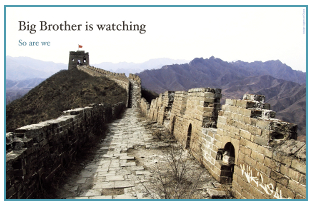 Ryan Gallagher, Open Democracy: Wikileaks: the truth is not treason Ryan Gallagher, Open Democracy: Wikileaks: the truth is not treason
"As international reaction testifies, the repercussions of Cablegate are massive. Wikileaks is changing the world without invitation, and the political establishment does not approve.[...]
“You can kill a man but you can't kill an idea,” as the civil rights activist Medgar Evers once said. And an idea is precisely what Wikileaks has become. It is no longer simply a website – it is a pure expression of democratic ideals, a philosophy realised by the force of technology. The powerful may condemn and attempt to repress Wikileaks and all it represents, but the situation has long since spun far from their control. Facilitated by the internet, a new battleground has been established. All traditions now hang in the balance and all bets are off."
Read more
Matthew Down, National Journal: To Tell the Truth
"Everyone in Washington claims to support transparency and government openness during campaign season and when it’s popular to do so. They castigate the other side when it does things in secret and suggest that its intentions must be nefarious if it is unwilling to make its deliberations public. But when an organization discloses how our foreign policy is conducted, some of these same people claim that the release will endanger lives or threaten national security, or that the founder of WikiLeaks is a criminal.
When did we decide that we trust the government more than its citizens? And that revealing the truth about the government is wrong? And why is the media complicit in this? Did we not learn anything from the run-up to the Iraq war when no one asked hard questions about the justifications for the war and when we accepted statements from government officials without proper pushback?[...]
If we want to restore trust in our government, maybe we can start by telling the truth, keeping fewer secrets, and respecting the privacy of average citizens a little more. As Ralph Waldo Emerson once said, “God offers to every mind its choice between truth and repose. Take which you please; you can never have both.”"
Read more
Guy Rundle, Crikey: WikiLeaks -- time for a register
"The first four stories on the UK news tonight were all either created by, or transformed by, the WikiLeaks Cablegate releases.
The governor of the Bank of England has been revealed as no benign public servant, but a player, trying to push the incoming government towards a harsher, more purely Thatcherite economic policy, and worried that they lacked the guts to do it; the Sri Lankan President was greeted with a huge demonstration supercharged with revelations of government involvement in massacres of Tamils; the "special relationship" is being battered by revelations of non-reciprocity on extradition, spy flyovers and the like; and even the separate news of Russia's winning the 2018 World Cup was set in the context of its utter corruption -- something that many people now felt they knew as much about as the elite, dictating the policy we should take towards them.
How long this will go on no-one knows. But while it does, power relations are being subtly transformed in ways that may have effects for some time to come. Once WikiLeaks manage to secure service, and eventually place the Cablegate logs online, there will be three huge volumes -- the Iraq logs, the Afghan logs and Cablegate -- which effectively constitute an alternative history of the present."
Read more
Jim Naureckas, FAIR: WikiLeaks Hasn't 'Leaked' Anything
"Actually, Julian Assange didn't leak anything--he can't, because he didn't have access to classified documents. Someone (or someones) who did have such access leaked those documents to Assange's WikiLeaks, which, as a journalistic organization, made them available to the world, both directly and through other media partners.
This distinction, which is widely ignored in commentary on WikiLeaks, is actually quite important, because the ethical obligations of a government official with a security clearance are quite different from those of a media outlet.[...]
To treat Assange as a leaker when he is, in fact, a journalist is not only morally confusing, it's quite dangerous to journalists in general. If the government can declare Assange to be spy or a terrorist because he's published classified documents he's received, every investigative journalist who does the same thing is in deep trouble."
Read more
John Naughton: What the attacks on WikiLeaks tell us
"Like most people, I’ve only read a fraction of what’s been published by WikiLeaks, but one thing that might explain the official hysteria about the revelations is the way they comprehensively expose the way political elites in Western democracies have been lying to their electorates. The leaks make it abundantly clear not just that the US-Anglo-European adventure in Afghanistan is doomed (because even the dogs in the street know that, as we say in Ireland), but more importantly that the US and UK governments privately admit that too.
The problem is that they cannot face their electorates — who also happen to be the taxpayers who are funding this folly — and tell them this.[...]
What WikiLeaks is exposing is the way our democratic system has been hollowed out. Governments and Western political elites have been shown to be incompetent (New Labour and Bush Jnr in not regulating the financial sector; all governments in the area of climate change), corrupt (Fianna Fail in Ireland, Berlusconi in Italy; all governments in relation to the arms trade) or recklessly militaristic (Bush Jnr and Tony Blair in Iraq) and yet nowhere have they been called to account in any effective way. Instead they have obfuscated, lied or blustered their way through. And when, finally, the veil of secrecy is lifted in a really effective way, their reaction is to try to silence the messenger — as Noam Chomsky pointed out."
Read more
Bernard Keane, Crikey: Missing the point on WikiLeaks
"This rolling series of releases — and WikiLeaks has barely begun to release the amount of material it has — is raising fundamental issues not merely about statecraft and diplomacy but information, power and the role of the media. Guy Rundle spotted this immediately, and while I would say that, wouldn’t I, his analysis has been the best you’ll see in an Australian publication. This is about far more than a simple matter of leaking sensitive cables, or newspaper coverage of those leaks.
Instead we’re given an uncomprehending coverage by the Australian media, as if it simply can’t process what’s happening, and needs to keep trying different narratives to see if they fit what’s being observed, sticking with whatever seems to temporarily do the trick.[...]
It’s not entirely fair to blame the media, though, because the Australian government is doing exactly the same thing. The response of the federal government has been… I was going to say “instructive”, but it’s more accurately, and sadly, affirmative of what you suspected, that politicians and bureaucrats can’t see this through any other than a rather 20th century, Cold War-style lens."
Read more
James Moore, The Huffington Post: WikiLeaks and the Myth of Journalistic Objectivity
"There is a very simple reason WikiLeaks has sent a furious storm of outrage across the globe and it has very little to do with diplomatic impropriety. It is this: The public is uninformed because of inadequate journalism. Consumers of information have little more to digest than Kim Kardashian's latest paramour or the size of Mark Zuckerberg's jet. Very few publishers or broadcasters post reporters to foreign datelines and give them time to develop relationships that lead to information. Consequently, journalism is atrophying from the extremities inward and the small heart it has will soon become even more endangered.
So, long live WikiLeaks and Julian Assange. And if Pfc. Bradley Manning is the leaker, he deserves the Presidential Medal of Freedom.
Good government, if such a thing exists, is the product of transparency. Americans have very little idea of the back-stories that lead to the events they see on the nightly news or read about on the net. How did such messes end up being such messes? If journalism were functioning at appropriate levels, there would have been stories that reported some of the information contained in the cables now published around the globe."
Read more
Source: wlcentral.org
 De mii de ani, maladiile nu au incetat sa-i macine pe pamanteni, declansand adesea epidemii catastrofale, care au luat un greu tribut in vieti omenesti. Descoperirea, in ultimele doua secole, a unor medicamente sau antibiotice eficiente, a reprezentat un urias pas inainte in lupta cu boala. Au fost astfel invinse, rand pe rand, afectiuni care altadata faceau ravagii, ucigand milioane de oameni, precum ciuma, holera, tuberculoza sau sifilisul. Singura boala grava, existenta si astazi, ca si in trecut, ramane cancerul, impotriva careia rezultatele obtinute sunt inca neconvingatoare. Dar si in acest domeniu, medicii au noi sperante, gratie unei descoperiri de ultima ora. De mii de ani, maladiile nu au incetat sa-i macine pe pamanteni, declansand adesea epidemii catastrofale, care au luat un greu tribut in vieti omenesti. Descoperirea, in ultimele doua secole, a unor medicamente sau antibiotice eficiente, a reprezentat un urias pas inainte in lupta cu boala. Au fost astfel invinse, rand pe rand, afectiuni care altadata faceau ravagii, ucigand milioane de oameni, precum ciuma, holera, tuberculoza sau sifilisul. Singura boala grava, existenta si astazi, ca si in trecut, ramane cancerul, impotriva careia rezultatele obtinute sunt inca neconvingatoare. Dar si in acest domeniu, medicii au noi sperante, gratie unei descoperiri de ultima ora.
Numarul cazurilor de cancer este, o arata statisticile, mult mai mare in prezent decat era, de pilda, in urma cu un secol. De vina par a fi poluarea, alimentatia haotica si nesanatoasa, stresul accentuat in care omul modern isi traieste viata. Nu-i de mirare ca la ora actuala cancerul constituie, alaturi de maladiile cardiace, principala cauza de deces in lumea civilizata. Tentativele de descoperire a unui vaccin anti-cancer sau macar a unor tratamente mai eficiente si mai putin periculoase decat radioterapia sau chimioterapia nu au incetat sa apara, in ultimele trei decenii.
98% din celulele canceroase sunt distruse
 Cea mai noua metoda a fost pusa la punct de catre cercetatorii de la North Carolina's Wake Forest University. Acestia au recoltat celule albe de la voluntari care s-au dovedit „imuni la cancer”, celule pe care le vor injecta bolnavilor de cancer, pentru a-i ajuta sa lupte contra necrutatoarei afectiuni. Celulele imune, numite granulocite, combat in mod obisnuit bacteriile, dar experimente efectuate anul acesta in Statele Unite au dovedit ca unele dintre ele pot anihila, de asemenea, si celulele canceroase. O importanta descoperire a fost aceea ca la unii oameni granulocitele actioneaza mult mai eficient, in lupta cu celulele canceroase, decat la alti oameni. Cea mai noua metoda a fost pusa la punct de catre cercetatorii de la North Carolina's Wake Forest University. Acestia au recoltat celule albe de la voluntari care s-au dovedit „imuni la cancer”, celule pe care le vor injecta bolnavilor de cancer, pentru a-i ajuta sa lupte contra necrutatoarei afectiuni. Celulele imune, numite granulocite, combat in mod obisnuit bacteriile, dar experimente efectuate anul acesta in Statele Unite au dovedit ca unele dintre ele pot anihila, de asemenea, si celulele canceroase. O importanta descoperire a fost aceea ca la unii oameni granulocitele actioneaza mult mai eficient, in lupta cu celulele canceroase, decat la alti oameni.
Acest fapt incurajeaza planurile vizand eventuale transplanturi de celule anti-cancer, de la persoanele sanatoase la cele bolnave. Au fost examinate mostre de celule albe provenind de la o suta de barbati si femei, alesi aleatoriu, dintr-un lot de voluntari. Unele mostre au distrus 98% din celulele canceroase, in 24 de ore, in vreme ce altele n-au reusit sa ucida decat 2%! Studiul a mai aratat ca stresul, varsta inaintata si sezonul rece au efecte negative asupra granulocitelor. La bolnavii de cancer, acestea nu mai sunt deloc eficiente, desi nu este clar ce anume le scade puterea.
Primul pacient va beneficia, voluntar, de inedita terapie ce vizeaza „insanatosirea celulelor”, incepand de vara viitoare, dupa ce echipa de cercetatori americani va mai efectua o serie de studii si teste, intrucat injectarea de celule straine intr-un organism poate provoca probleme serioase: celulele transplantate pot afecta corpul de imprumut. „Conceptul de a folosi celule imune de la o persoana sanatoasa la una bolnava de cancer este unul de actualitate, dar nu cunoastem inca riscurile la care am putea expune pacientul bolnav.
Implementarea unor celule vii da riscul, cel putin teoretic, declansarii asa-numitei boli de respingere, care in cele mai multe cazuri este fatala”, apreciaza profesorul John Gribben, de la unitatea de cercetare a cancerului, din cadrul spitalului londonez St. Bartolomew. Si totusi, colegii sai americani sunt optimisti in aceasta privinta, amintind ca experiente similare, facute pe cobai, incepand cu anul 1999, au demonstrat ca animalele de laborator nu manifestau tentative de respingere a celulelor transplantate, ba dimpotriva, chiar cobai cu cancer in stadii avansate reuseau sa atenueze in mare masura efectele bolii si sa-i incetineasca extinderea.
GABRIEL TUDOR - revista Magazin
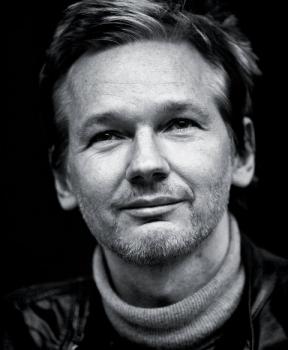 The New York Times' T Magazine features a short profile on Julian Assange and WikiLeaks: The New York Times' T Magazine features a short profile on Julian Assange and WikiLeaks:
"Julian Assange and WikiLeaks have been jettisoned to fame or notoriety (choose your noun, please) not because of a passing political battle but for reasons much deeper: the desire to possess, distribute and devour information. Ever since the release in July this year of some 92,000 documents relating to America’s involvement in Afghanistan, an old joke from Communist times keeps spinning around my head. ‘‘We cannot predict the future,’’ announces the newsreader of Soviet radio reporting on the Politburo’s deliberations, ‘‘but the past is changing before our very eyes.’’ Now our understanding of the nature of the intervention in Iraq has also changed radically with the publication of a still more astonishing collection of 391,832 secret United States military field reports from the kaleidoscopic theaters of battle.[...]
Assange understands full well the significance of these documents and their surreptitious transmission, and that knowledge translates into power and influence. For most of history, government has enjoyed an easy superiority in adjusting the ebb and flow of information. Now the rules of the contest have changed. In contrast to the petabytes of data flotsam, half-truths and speculation that drift daily around the Internet, WikiLeaks spews forth unvarnished, sensitive truths. Assange’s extraordinary project provides transparency unbridled. Historians, journalists and civic activists will continue to fish in these rich informational waters for some time if the organization does not collapse."
Read more
Photo credit: Max Vadukul, The New York Times
Wikileaks is currently under heavy attack.
In order to make it impossible to ever fully remove Wikileaks from the Internet, we need your help.
if you have a unix-based server which is hosting a website on the Internet and you want to give wikileaks some of your hosting resources, you can help!
Please follow the following instructions:
- Setup an account where we can upload files using RSYNC+SSH (preferred) or FTP
- Put our SSH key in this server or create an FTP account
- Create a virtual host in your web server, which, for example, can be
wikileaks.yourdomain.com
- send the IP address of your server to us, and the path where we should upload the content. (just fill the form below)
We will take care of all the rest: Sending pages to your server, updating them each time data is released, maintaining a list of such mirrors. If your server is down or if the account don't work anymore, we will automatically remove your server from the list.
Our content is only html/css/javascript/png static files, so we don't require much resource to host it.
The complete website should not take more than a couple of GB at the moment (with base website and cablegate data)
To add your mirror to the list, please download the SSH key you will find below, then fill the following form to add your website to our mirror list :
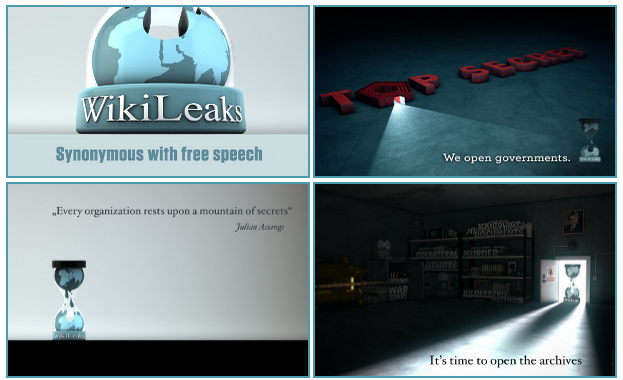
Share a Wikileaks release with a friend. Spread our wallpapers. Donate to support vital infrastructure. If you believe democracy and transparency go hand in hand, now is the time to stand and say: "The world needs Wikileaks."
DONATE
WikiLeaks brings truth to the world by publishing fact-based stories without fear or favor. You can help support our independent media by donating financially.
Our organisation exists because of the work of many volunteers who have contributed thousands of hours to building WikiLeaks from the ground up. But we still need donations to pay for computers, expert programmers and other bills. You choose how much you can donate, we don't recommend any particular amount. Just do what you think is right.
There are four ways to donate:
Donate to Julian Assange Defence Fund
Online Transfer via Credit Card
Bank Transfer [option 1: everyone]
Bank Transfer [option 2: tax deductible in Germany]
Paypal via Wau Holland Foundation
Postal Mail
1. Julian Assange Defence Fund
Swiss cut off bank account for WikiLeaks' Assange. And here is why
2. Online Transfer via Credit Card
Using our friendly credit card processing partner Datacell Switzerland.
3. Bank Transfer - Option 1: via Sunshine Press Productions ehf:
Skulagötu 19, 101 Reykjavik, Iceland
Landsbanki Islands Account number 0111-26-611010
BANK/SWIFT:NBIIISREXXX
ACCOUNT/IBAN:IS97 0111 2661 1010 6110 1002 80
4. Bank Transfer - Option 2: via the not-for-profit Wau Holland Stiftung Foundation:
This support is tax deductible in Germany
Bank Account: 2772812-04
IBAN: DE46 5204 0021 0277 2812 04
BIC Code: COBADEFFXXX
Bank: Commerzbank Kassel
German BLZ: 52040021
Subject: WIKILEAKS / WHS Projekt 04
5. PayPal via Wau Holland Foundation
We don't accept paypal donations anymore. And here is why
6. Via Postal Mail
You can post a donation via good old fashion postal mail to:
WikiLeaks
(or any suitable name likely to avoid interception in your country)
BOX 4080
Australia Post Office - University of Melbourne Branch
Victoria 3052
Australia
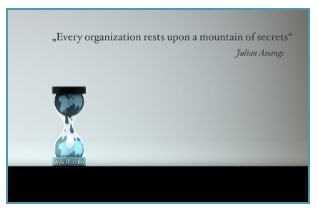 The Guardian: WikiLeaks cables blame Chinese government for Google hacking The Guardian: WikiLeaks cables blame Chinese government for Google hacking
"The hacking of Google that forced the search engine to withdraw from mainland China was orchestrated by a senior member of the communist politburo, according to classified information sent by US diplomats to Hillary Clinton's state department in Washington.
The leading politician became hostile to Google after he searched his own name and found articles criticising him personally, leaked cables from the US embassy in Beijing say.
That single act prompted a politically inspired assault on Google, forcing it to "walk away from a potential market of 400 million internet users" in January this year, amid a highly publicised row about internet censorship."
Read more
The Guardian: WikiLeaks cables: Spanish PM helped GE beat Rolls-Royce to helicopter deal
"Rolls-Royce lost a lucrative contract to supply helicopter engines to the Spanish military because of a personal intervention by Spain's prime minister, José Luis Zapatero, following vigorous lobbying from US diplomats, according to a secret cable from the US embassy in Madrid.
Eduardo Aguirre, the departing US ambassador to Spain, recounts behind-the-scenes diplomatic machinations that helped General Electric snatch a deal away from Rolls-Royce to provide engines for a state-of-the-art fleet of helicopters bought by the Spanish armed forces, a contract estimated by industry experts to be worth more than Ł200m.
Details of how Britain's best-known engineering company lost out to the Americans will fuel concerns that the so-called UK-US special relationship does not always deliver results."
Read more
The Guardian: WikiLeaks: Hillary Clinton's question: how can we stand up to Beijing?
"Hillary Clinton revealed America's deep anxiety over China's growing economic power and hold on US finances by asking Australia's then prime minister: "How do you deal toughly with your banker?"
The question, at a lunch with Kevin Rudd last March and reported in a US Department of State cable, underscores the evolving and often difficult relationship between the world's superpower and an increasingly mighty China. It is the largest holder of US treasury bonds, with around $870bn. Tensions are also highlighted in an economic dispatch, written by the US ambassador to Beijing last January, warning of a "rough" year for relations between the two countries and accusing China of hubris."
Read more
The Guardian: WikiLeaks cables reveal fears over Chinese cyber warfare
"The US fears China is plotting internet warfare via private companies that are known to have recruited top hackers.
According to leaked cables, the state department is concerned about Beijing's close working relationship with two major providers of information security in China. The companies have hired experienced hackers, who include Lin Yong, aka Lion, who founded the Honker Union of China, a Chinese hacker group that emerged after the US bombing of the Chinese embassy in Belgrade in 1999 and launched a series of cyber attacks on US government-related websites."
Read more
The New York Times: U.S. Aided Mexican Drug War, With Frustration
"More than a year ago — before drug cartels killed a gubernatorial candidate and began murdering mayors, before shootings and kidnappings in Mexico’s industrial capital, Monterrey, surged to the point that the State Department ordered children of American diplomats there to leave the country — a Mexican official admitted that the government feared it could lose control of parts of the nation.[...]
In the account of the meeting, which was included in the American diplomatic cables made public by WikiLeaks and posted on Mexican news Web sites, Mr. Gutiérrez was quoted as saying: “We have 18 months and if we do not produce a tangible success that is recognizable to the Mexican people, it will be difficult to sustain the confrontation into the next administration.” "
Read more
The New York Times: Cables Discuss Vast Hacking by a China That Fears the Web
"As China ratcheted up the pressure on Google to censor its Internet searches last year, the American Embassy sent a secret cable to Washington detailing one reason top Chinese leaders had become so obsessed with the Internet search company: they were Googling themselves.[...]
But the cables also appear to contain some suppositions by Chinese and Americans passed along by diplomats. For example, the cable dated earlier this year referring to the hacking attack on Google said: “A well-placed contact claims that the Chinese government coordinated the recent intrusions of Google systems. According to our contact, the closely held operations were directed at the Politburo Standing Committee level.”"
Read more
The New York Times: Yemen Sets Terms of a War on Al Qaeda
"One Obama administration security official after another was visiting to talk about terrorism, and Yemen’s redoubtable president, Ali Abdullah Saleh, seemed to be savoring his newfound leverage.
The Americans are “hot-blooded and hasty when you need us,” Mr. Saleh chided one visitor, Daniel Benjamin, the State Department’s counterterrorism chief, but “cold-blooded and British when we need you.” [...]
Mr. Saleh said coyly that while he was “satisfied” with the military equipment the United States was supplying, he “would like to be more satisfied in the future,” according to an account of the meeting sent to Washington."
Read more
|
|
Ci sono 4709 persone collegate
|
<
|
aprile 2024
|
>
|
L |
M |
M |
G |
V |
S |
D |
1 |
2 |
3 |
4 |
5 |
6 |
7 |
8 |
9 |
10 |
11 |
12 |
13 |
14 |
15 |
16 |
17 |
18 |
19 |
20 |
21 |
22 |
23 |
24 |
25 |
26 |
27 |
28 |
29 |
30 |
|
|
|
|
|
| |
|
|
|
|
|
|
24/04/2024 @ 01:23:05
script eseguito in 685 ms
|
 Frontline Club: WikiLeaks - The US embassy cables
Frontline Club: WikiLeaks - The US embassy cables



 (p)Link
(p)Link Commenti
Commenti Storico
Storico
 Stampa
Stampa Il turista questa volta vi propone un magnifico lago del Trentino, caratteristico ma un po' dimenticato, caduto in oblio dopo che era diventato famoso a cavallo degli '50 e '60. Molti di voi avranno sentita parlare che presso il lago di Tovel.
Il turista questa volta vi propone un magnifico lago del Trentino, caratteristico ma un po' dimenticato, caduto in oblio dopo che era diventato famoso a cavallo degli '50 e '60. Molti di voi avranno sentita parlare che presso il lago di Tovel. Il lago fu generato da una gigantesca frana che nel 1300 discese dal monte Corno e sbarrò il percorso del torrente. Risalendo la strada è facile accorgersi della frana che forma un accumulo di giganteschi massi chiamati marocche. Superato lo sbarramento la strada asfaltata scende al lago. Qui una volt parcheggiata l'auto è possibile compiere il periplo del lago (circa 5 km) a piedi, considerate circa un ora e mezzo, ma il dislivello di soli 50 m è davvero per tutti..
Il lago fu generato da una gigantesca frana che nel 1300 discese dal monte Corno e sbarrò il percorso del torrente. Risalendo la strada è facile accorgersi della frana che forma un accumulo di giganteschi massi chiamati marocche. Superato lo sbarramento la strada asfaltata scende al lago. Qui una volt parcheggiata l'auto è possibile compiere il periplo del lago (circa 5 km) a piedi, considerate circa un ora e mezzo, ma il dislivello di soli 50 m è davvero per tutti.. RSF: WikiLeaks hounded?
RSF: WikiLeaks hounded? De mii de ani, maladiile nu au incetat sa-i macine pe pamanteni, declansand adesea epidemii catastrofale, care au luat un greu tribut in vieti omenesti. Descoperirea, in ultimele doua secole, a unor medicamente sau antibiotice eficiente, a reprezentat un urias pas inainte in lupta cu boala. Au fost astfel invinse, rand pe rand, afectiuni care altadata faceau ravagii, ucigand milioane de oameni, precum ciuma, holera, tuberculoza sau sifilisul. Singura boala grava, existenta si astazi, ca si in trecut, ramane cancerul, impotriva careia rezultatele obtinute sunt inca neconvingatoare. Dar si in acest domeniu, medicii au noi sperante, gratie unei descoperiri de ultima ora.
De mii de ani, maladiile nu au incetat sa-i macine pe pamanteni, declansand adesea epidemii catastrofale, care au luat un greu tribut in vieti omenesti. Descoperirea, in ultimele doua secole, a unor medicamente sau antibiotice eficiente, a reprezentat un urias pas inainte in lupta cu boala. Au fost astfel invinse, rand pe rand, afectiuni care altadata faceau ravagii, ucigand milioane de oameni, precum ciuma, holera, tuberculoza sau sifilisul. Singura boala grava, existenta si astazi, ca si in trecut, ramane cancerul, impotriva careia rezultatele obtinute sunt inca neconvingatoare. Dar si in acest domeniu, medicii au noi sperante, gratie unei descoperiri de ultima ora. Cea mai noua metoda a fost pusa la punct de catre cercetatorii de la North Carolina's Wake Forest University. Acestia au recoltat celule albe de la voluntari care s-au dovedit „imuni la cancer”, celule pe care le vor injecta bolnavilor de cancer, pentru a-i ajuta sa lupte contra necrutatoarei afectiuni. Celulele imune, numite granulocite, combat in mod obisnuit bacteriile, dar experimente efectuate anul acesta in Statele Unite au dovedit ca unele dintre ele pot anihila, de asemenea, si celulele canceroase. O importanta descoperire a fost aceea ca la unii oameni granulocitele actioneaza mult mai eficient, in lupta cu celulele canceroase, decat la alti oameni.
Cea mai noua metoda a fost pusa la punct de catre cercetatorii de la North Carolina's Wake Forest University. Acestia au recoltat celule albe de la voluntari care s-au dovedit „imuni la cancer”, celule pe care le vor injecta bolnavilor de cancer, pentru a-i ajuta sa lupte contra necrutatoarei afectiuni. Celulele imune, numite granulocite, combat in mod obisnuit bacteriile, dar experimente efectuate anul acesta in Statele Unite au dovedit ca unele dintre ele pot anihila, de asemenea, si celulele canceroase. O importanta descoperire a fost aceea ca la unii oameni granulocitele actioneaza mult mai eficient, in lupta cu celulele canceroase, decat la alti oameni. The New York Times'
The New York Times'



 Feed RSS 0.91
Feed RSS 0.91 Feed Atom 0.3
Feed Atom 0.3
